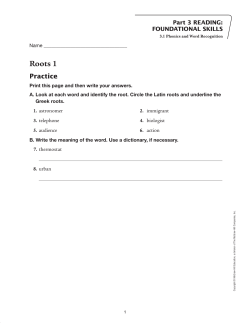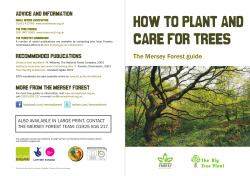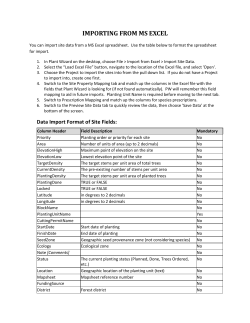
Deep Planting - Lee County Extension
Diagnosing Tree, Palm and Shrub Problems: Deep Planting of Autograph Tree (Clusia rosea) Stephen H. Brown Lee County Horticulture Agent brownsh@ufl.edu (239) 533-7513 Autograph tree (Clusia rosea), otherwise known as Clusia or pitch apple, is commonly planted as a hedge in South Florida. It is a very salt and wind tolerant species. When the smooth leaves are scratched, it leaves a permanent mark and it is not unusual to see initials and other notations on the lower leaves. Situation A hedge row of autograph tree was reported in distress with pale colored and falling leaves. A visit was made to the site to assist in determining the cause of the decline. The height of the hedge row was about 8 feet tall. The plants were installed about four years prior to significant signs of decline. Declining plants in a hedge row of autograph trees. 2 The plant roots of this pitch apple is 11 inches below the soil’s surface. Pale, drooping leaves of distressed plant. Properly planted shrub with upper roots as large as the diameter of some of the stems. Healthy leaves of Autograph tree. Inspection and Findings About eight plants made up the hedge row. Two adjacent plants at one end of the row were in severe decline, the remaining plants looked healthy. Deep planting of the distressed plants was immediately suspected. The planting depths of the two distressed plants were checked by removing the soil from around the trunk to the depth of the roots. The planting depths of both plants were measured, one being at a depth of 11 inches the other at 12 inches below the soil’s surface. Dark soil-stained areas on the trunks of the dying shrubs were also signs of deep planting. The roots of these plants were partially or completely rotted and the buried trunks had partly deteriorated. The root depth of a healthy plant was examined and was found to be about an inch below the soil’s surface. 3 To check the depth of roots, remove the soil, to the point of the main roots. The main roots will be comparable in size to some of the plant’s limb diameter. If you find small fibrous roots near the soil’s surface, keep digging. These fibrous roots are the plant’s attempt to compensate for deep planting. Roots and buried trunk tissues were sent to the plant disease clinic at the University of Florida, Gainesville, for analyses. Results and Conclusions Fusarium sp. was isolated from the plant tissues sent to the plant disease clinic. This fungus is frequently isolated from root and stem tissues of plants that are planted too deeply. The disease is considered to be secondary with the primary problem being deep planting. Planting too deeply is one of the most common causes of trees, shrubs and palms failures. Just a couple of inches too deep can lead to an untimely death. The effect is usually not immediate, but overtime the affected plant appears stunted, the leaves turn chlorotic and most often disease sets in due to the added stress. Planting too deeply restricts oxygen from getting to the roots of plants. Atmospheric oxygen is essential for plant growth. Without oxygen roots suffocate, die and eventually decay. This is especially true if the plants are over watered, if the soil is slow draining, or a hardpan exists below the roots, or the plants are in a depression that collects water. Preventative management practices are the first line of defense against stem, crown and root rot diseases caused by deep planting. Fusarium, Cylindrocladium, Rhizoctonia and Thielaviopsis fungi are associated with this malpractice. Be sure to give your plants the proper start in your garden and landscape by planting them at the right soil depth. Plant Disease Links Algal Leaf Spots of Cocoplum Anthracnose Disease of Ornamental Plants Disease Management of Ornamental Plants Eugenia, Ligustrum, Oleander Diseases Indian Hawthorn Diseases Key Plants/Key Pests Rust Disease on Senna surattensis Mosaic Virus of Beautyberry Mosaic Virus of St. Augustinegrass Planting too Deeply will Kill Trees and Shrubs This fact sheet was reviewed by Dr. Aaron Palmateer, UF Plant Pathologist, Tropical REC and Peggy Cruz, Lee County Extension. The Institute of Food and Agricultural Sciences (IFAS) is an Equal Opportunity Institution authorized to provide research, educational information and other services only to individuals and institutions that function with non-discrimination with respect to race, religion, age, disability, sex, sexual orientation, martial status, national origin, political opinions or affiliations. U.S. Department of Agriculture, Cooperative Extension Service, University of Florida, IFAS, Florida A. & M. 5/2015
© Copyright 2025













